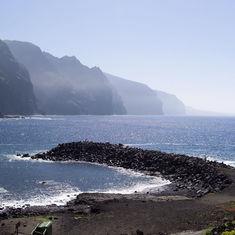
Any retrospective on the UK fruit trade would be incomplete without a mention of the major role played by the Canary Islands.
By the time Queen Elizabeth II acceded to the throne in 1952, the commercial relationship with Canary Islands growers was already enjoying its own diamond anniversary. It was the British who first started growing tomatoes on the islands in 1885, taking advantage of ships passing from Africa and the names of those pioneering traders still have some resonance today: Elder, Yeoward, Wolson, Pilcher and Fyffe. It is also worth remembering that this was how Canary Wharf got its name.
“But you need to look back to the 1940s to see the start of the heyday of tomato plantings,” says Roberto Goiriz Ojeda, spokesman for the islands’ exporters’ association Fedex. “Then, the UK was the exclusive destination of Canary Islands tomatoes. Leading up to the 1980s, sendings diversified into aubergines, peppers, avocados and green beans, but exports of these products have fallen away because of the costs of production and the large amount of labour they require. Potatoes were also a very important export to the UK. Nevertheless, it is no wonder that Queen Elizabeth II has eaten and continues to eat cucumbers and tomatoes grown in the Canary Islands.”
The UK remains the islands’ biggest market - accounting for 54 per cent of sendings, with the rest going to continental Europe. “You have to remember that in the heyday, there were Canary Islands exporters who had never been to mainland Spain: they knew London better than Madrid. The UK market for us has not just been a priority, it has been historic, fundamental and transcendental.”
Victoria Trading has been importing from the Canary Islands since it was founded in 1928 and has become synonymous with the Bonny brand. Andrew Zerpa Falcon, general manager at the Kent-based family firm, says: “The Canary Islands have a number of significant advantages, first of all the climate: rarely do temperatures fall below 10°C in winter. Compare that with mainland Spain where there can be frosts in winter in Almeria. We can maintain supplies throughout the winter and customers understand and appreciate that.
“Another advantage is our carbon footprint. Bonny represents 50 per cent of the trade and a critically important factor for the supermarkets has been our energy efficiency.”
Although trade has diminished over the years, it is the long-established companies such as Victoria Trading and Bonny that have survived because of their investment and forward-thinking approach. “We are developing a new project now to produce melons when mainland Spain can’t,” Zerpa Falcon says. “We will be able to plant in winter when growers on the peninsula can’t. We have been working on this for a couple of years on Piel de Sapo and Galia. We could have melons from the Canaries in March and April and it would mean a longer season for Spanish fruit as they can’t be grown elsewhere in Europe then. We are also looking at papaya.”
Zerpa Falcon believes that with innovations such as these the future commercial relationship between the islands and the UK is assured. “I think the UK public expects salad products from the Canaries. Their strengths are their proximity, climate and heritage of growing for the UK.” -



